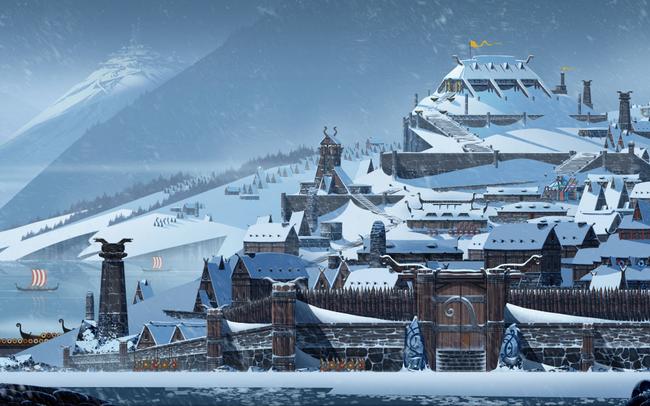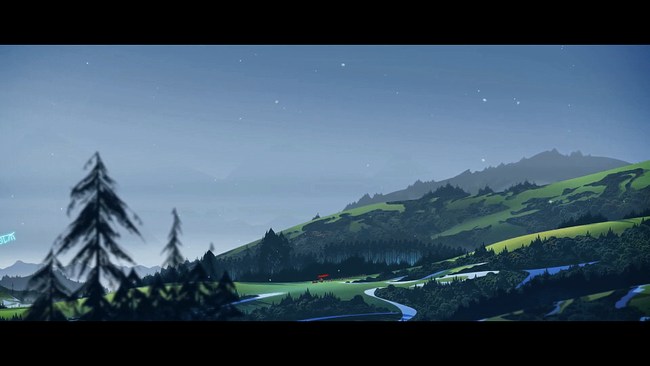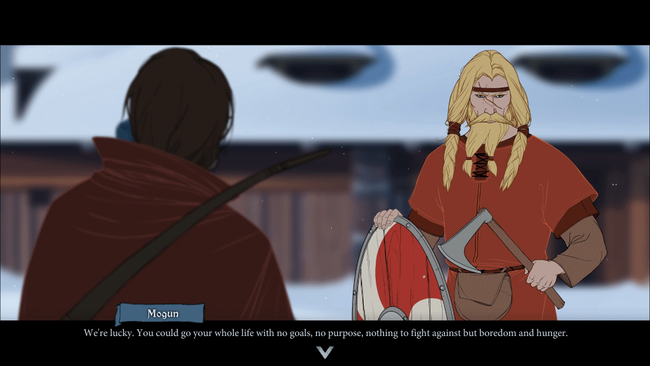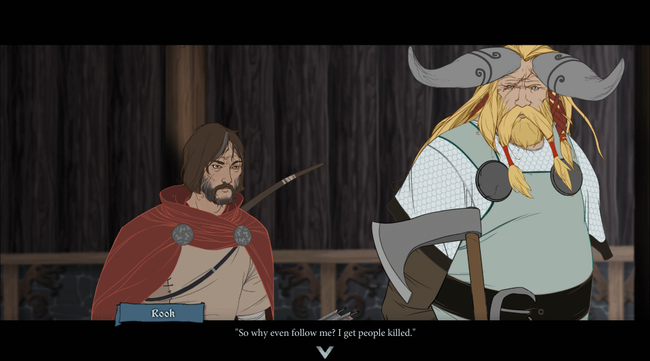
The Banner Saga and the Pain of Choice
Please note: This article will have spoilers for The Banner Saga 1 and 2.
Hundreds of helpless, innocent people placed their lives in their hands, and I’ve failed them. They were killed by thieves, massacred by the dredge, drowned and starved to death. I tried to help everyone I came across, and in doing so forfeited the lives of many, due to rebellions and a lack of food. Some of the dead are dear friends and family, others nameless faces that followed me in hope of a safe future, but regardless their blood is solely on my hands.

The Banner Saga is far from the first game that offers tough decisions to the player, but it’s one of the few that I’ve really felt the effects of my myriad of choices throughout. The world of Banner Saga is one that is slowly dying--with the gods themselves dead and the sun forever stuck in the sky, the remaining denizens of the world eke by a livable existence. However, the dangerous dredge have begun to attack settlements, and in one such attack, one of the main characters of The Banner Saga, Rook, is suddenly placed in charge of getting the villagers to safety.
It’s a difficult job, and certainly not one Rook asked for, but one he must do regardless. As the player, it’s your job to try to manage the caravan and its resources, as well as lead your party into battle to fight off the dredge. All this comes with a lot of decision making, and the way The Banner Saga handles these choices is what really makes it stand out amongst other games.
Everything you do, from how you use your limited Renown, to how many supplies you bring, to who you bring into battle and when all have long-lasting consequences on the caravan, and these decisions cannot be reversed. Planning for the worst and hoping for the best is the name of the game here, but no one can be completely prepared for every scenario thrown their way.

While I played through the first game, I tried to bring as many people into my caravan as possible. I couldn’t stand to see innocent villagers get left behind and slaughtered by the oncoming dredge, so I always encouraged them to join the caravan and march to safety. However, this mindset bought a number of tragedies upon the caravan. Food was stolen, stretching already meager supplies thin, and in-fighting caused a number of deaths and lost morale. All of this accumulated in a coup instigated by one of the main members of the group, who was trusted by Rook but eventually tired of his soft-hearted ways. The mutiny caused the death of a number of people (including one of my better party members), and grievous wounds to Rook himself.
But, in the back of my mind, I wonder, was there a better way to handle this? Should I have really left these villagers behind, closed Rook’s heart off to trust, and simply looted places and left others for dead for the good of the caravan? The truth is that it’s impossible to tell what the correct choice is, and oftentimes there’s never a clear-cut, ‘correct’ answer. Every choice has real consequences, and the fact of the matter is, you can’t save everyone no matter what choice you choose.
After the rebellion, Iver, the cool-headed and logical Varl, told me that I needed to be more careful about who to let into the caravan. I rejected that opinion, saying I would not change my ways because of a few bad apples. And although I never did change my ways, Rook and the caravan continued to suffer from the choices I had already made.

All of this stressful, and sometimes futile, decision-making comes to a head in Chapter 7, the final chapter of the first game. With an army of dredge coming upon a ruined city, Rook’s attention is pulled in too many directions. It’s up to him to man the walls to hold off the dredge, find supplies and shelter for those who cannot fight, and try to assist in building ships to escape. It’s too much for one man to handle, and it shows.
When I first came upon the city, I only had two days of supplies, so if I wanted to make sure no one starved, I had to search for more food first. However, trying to get supplies was a multi-day process, and I paid dearly for them. With my caravan exposed in a dangerous place, many people died, not to mention the ones that starved as I desperately attempted to get supplies. Iver, trying to hold the gates as best as he could, grew too tired to properly lead the troops, leading to needless deaths on the battlefield. It was the only time in the game where Rook, and by extension myself, asked if it all could have been handled better. But if nothing else, Chapter 7 really drives home how dangerous, and sometimes hopeless, world The Banner Saga exists is. One man can only do so much.

At the beginning of The Banner Saga 2, the stress of leadership shows. Rook is immediately shown as a broken man--watching so many under his care, including his own daughter, is too much for the man to bear. It shows in his actions (throwing himself into hordes of dredge without a care for safety), and even in the dialogue choices you can pick when controlling him, with less inspiring choices of hope and more choices of a tired man who can barely continue on. A lot of this is more subtle than many games of its ilk, which will often times bash guilt over the players’ heads, without given an actual option in the matter of tragedy.
The Banner Saga presents these choices and consequences in a matter of fact way. The world is cold and cruel, and no one will survive unscathed. The game does not guilt you for your decisions, though in the back of your mind you’ll always wonder if you made the right choice. The trick is, there's never a right choice, as you can never save everyone, and that makes the consequences all the more painful.